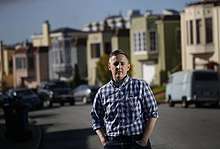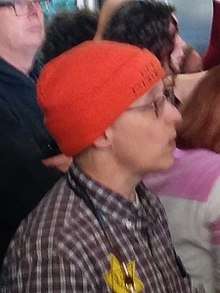Jenni Olson
Jenni Olson (born October 6, 1962) is an American film curator, filmmaker, author, and LGBT film historian. She was born and raised in Falcon Heights, Minnesota. She co-founded the pioneering LGBT website PlanetOut.com,[1] and campaigned to have a barrier erected on the Golden Gate Bridge to prevent suicides.[2]


Biography
Olson was educated at the University of Minnesota. In 1986, while still a student, Olson co-founded the Minneapolis/St.Paul Lesbian, Gay, Bi & Transgender Film Festival, initially under the name Lavender Images.[3] Olson was inspired in this move by Vito Russo's book, The Celluloid Closet. In 1992 Olson was hired by the company Frameline and moved to San Francisco to work as guest curator on the San Francisco International Lesbian and Gay Film Festival, before being appointed co-director alongside Mark Finch.[3] After three years Olson left this position to co-found the website PlanetOut.com.[4] Olson worked as director of entertainment and e-commerce for the site, as well fulfilling the same roles for Gay.com. She created the PopcornQ section of the PlanetOut.com website, basing the section on her book The Ultimate Guide to Lesbian & Gay Film and Video.[5][6]
In 1997 Olson attended the Sundance Festival and arranged, along with Outfest executive director Morgan Rumpf, a small brunch aimed at fellow queer attendees. The event has happened annually since then being co-presented by PlanetOut.com and Outfest until 2005. Since the demise of PlanetOut, it is now presented solely by Outfest.[7] The sponsors described it in 2005 as "the premiere gay and lesbian industry event during Sundance".[8] By March 2005, Olson was named Director of E-Commerce & Consumer Marketing for Wolfe Video/Wolfe Releasing.[1]
Works
Olson initially compiled trailers into documentary features, showing Homo Promo, her compilation of vintage gay movie trailers at the Amsterdam Gay & Lesbian Film Festival in 1991,[9] and her work in this area has been recognised as instructional in teaching students contextualisation.[10]
She continued compiling trailers throughout the 1990s, with her last such compilation released to date being Bride of Trailer Camp, released in 2001 (others in the series include: "Trailer Camp", "Neo Homo Promo", "Afro Promo", "Trailers Schmailers"). During this period Olson also wrote Ultimate Guide to Lesbian & Gay Film and Video (1996). The book was based on Olson's BA thesis.[11] Her next book was The Queer Movie Poster Book (Chronicle Books, 2005). This book was suggested in 1991 by Stuart Marshall, who recommended Olson pitch the idea to London's Gay Men's Press. Although the book was turned down by both them and Serpent's Tail, to whom the idea was pitched as a follow up to her previous book, Olson was eventually commissioned to write the book in 2002 (published in 2005, it went on to be a Lambda Literary Awards nominee). Olson based the work in part on her own collection of such material, which she has subsequently donated to San Francisco’s GLBT Historical Society.[9] Her collection was exhibited at the San Francisco Public Library in 2004, with Olson delivering an accompanying lecture.[3]
In 2005 Olson released The Joy of Life, her debut feature, which won Best Outstanding Artistic Achievement at the 2005 Outfest and at the 2005 Newfest received Best U.S. Narrative Screenplay,[12] and has been favorably reviewed in a number of publications. It garnered Olson the Marlon Riggs Award by the San Francisco Film Critics Circle in 2005. Working on the film led Olson to pen an open letter to the San Francisco Chronicle on the matter of the Golden Gate Bridge's position as the top suicide landmark in the world. Her former colleague, Mark Finch, had jumped from the bridge on January 14, 1995, and Olson used this event to inform her own film. Her letter was published on the tenth anniversary of Finch's death and supported the Psychiatric Foundation of Northern California's launching of a campaign for a barrier to be installed on the bridge.[13] Olson also distributed her film to the bridge's board of directors, noting "several of the bridge directors told me they appreciated seeing the film and found it illuminating",[4] and in March 2005 the board voted to explore the installation of a barrier to prevent jumping.[2]
Olson's 2009 short film, 575 Castro St. was shot on the empty Castro Camera store set of the Academy Award winning drama Milk. 575 Castro St. premiered at the 2009 Sundance Film Festival and has circulated to film festivals around the world as well as being showcased on the FilmInFocus.com website as part of the theatrical release of Milk and at the Human Rights Campaign Store (the former Castro Camera) in a looping presentation on view during regular store hours.
In 2015 Olson's film, The Royal Road premiered at the 2015 Sundance Film Festival. The film won the award for Best LGBTQ Film at the 2015 Ann Arbor Film Festival as well as the Avant Garde & Genre Special Jury Mention from BAFICI, the Buenos Aires International Independent Cinema Festival.
See also
References
- Ryan Diduck (June 30, 2006). "Inside the Homo Studio: with Jenni Olson". Queer Perspectives. Offscreen.com. Retrieved 2006-12-19.
- Blum, Andrew (March 20, 2005). "Suicide Watch". The New York Times. Retrieved October 3, 2015.
- Ford, Dave (October 15, 2004). "S.F. film historian's latest book uses movie posters to shed light on changing mainstream views of lesbians and gay men". San Francisco Chronicle. p. F1.
- Matt Baume (July 8, 2005). "Interview: Jenni Olson". SFist. Archived from the original on August 30, 2006. Retrieved 2006-12-19.
- "Contributor Biography: Jenni Olson". glbtq.com. Archived from the original on 2006-10-17. Retrieved 2006-12-19.
- "Cast and Crew". The Joy of Life official website. Archived from the original on 2006-12-08. Retrieved 2006-12-19.
- Jenny Stewart (January 20, 2005). "Where the indie-film A-gays play". Planetout.com. Retrieved 2006-12-19.
- "here! Networks to Present 10th Annual Outfest Queer Brunch at Sundance Film Festival" (Press release). here! Networks & Outfest: The Los Angeles Gay and Lesbian Film Festival. December 8, 2005. Archived from the original on September 11, 2012. Retrieved 2006-12-19.
- Morris, Gary (August 2004). "I Changed My Socially Constructed Sexual Identity!". Bright Lights Film Journal (45). ISSN 0147-4049. Archived from the original on 2009-07-14. Retrieved 2006-12-19.
- Siegel, Marc (May 1997). "Spilling out onto Castro Street". Jump Cut (41). pp. 131–136.
- "Drama and Film". Gay & Lesbian Research Guide. Yale University Library. 2006-08-05. Archived from the original on 2006-09-02. Retrieved 2006-12-19.
originated as her B.A. thesis at the University of Minnesota
- "Press Materials, Reviews, Upcoming Screenings". Official website. Archived from the original on 2006-11-02. Retrieved 2006-12-19.
- Olson, Jenni (January 14, 2005). "Power Over Life and Death: Another toll goes up on the Golden Gate Bridge". San Francisco Chronicle. p. B9.